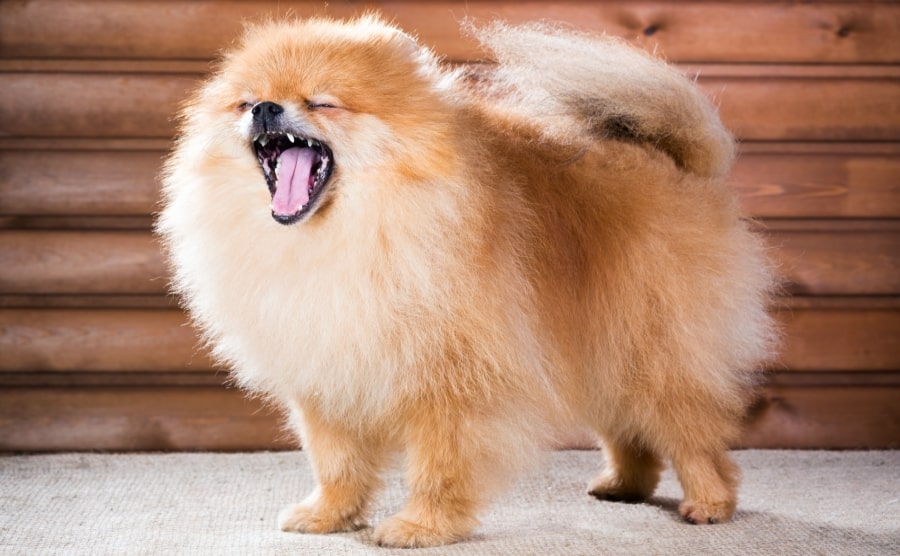Have you noticed stubborn baby teeth failing to leave? Are you worried they can cause problems for your little Pom? I’ve been keeping Pomeranians for quite some time now and I know exactly what you’re going through. When your little puppy is seven months old, their baby teeth are supposed to fall out. But, for some reason, they don’t.
So, why are your Pomeranian’s baby teeth not falling out? Small mouths are predisposed to retained teeth. Smaller breeds, like Pomeranians, Chihuahuas, Yorkshire Terriers, and Poodles are more prone to having retained baby teeth than any other dogs. A genetic predisposition (Malocclusion) is a common factor that can cause this problem.
Here, I will discuss everything you should know about retained baby teeth in Pomeranians, how to take proper action, and if or when you should be worried.
When Should My Pom’s Baby Teeth Start Falling out Naturally?
All puppies are born with no teeth. In total, your Pomeranian will have 28 primary teeth, but most of us call them baby teeth. The first tooth will pop up when your puppy is three weeks old. The teeth are expected to stop growing when your Pomeranian is four months old. That’s the exact time when the baby teeth are supposed to fall out.
When all the baby teeth do fall out, new permanent teeth will grow in their place. Your Pomeranian should have 42 permanent teeth when they are 6 to 8 months old.
Can Retained Baby Teeth Be a Problem for My Puppy?
Yes. Stubborn baby teeth in Pomeranians can be a huge problem. Most of my Pomeranian puppies dealt with this problem, and it wasn’t nice. Baby teeth are supposed to fall out naturally without interference; however, we sometimes have to rely on vets to take care of the problem for us.
If these teeth aren’t pulled out on time, they can cause some serious oral problems, some of which are accidental bites, permanent abnormal tooth positioning, incorrect jaw position, and pain when eating. It’s much better to take care of this problem before it causes serious pain to your puppy.
What Are the Ways I Can Spot Retained Baby Teeth in My Pomeranian?
You can easily spot the problem if you regularly check your dog’s jaw. It’s important that you monitor their health, especially for the first couple of months, since their baby teeth are supposed to fall out by the end of the 4th month.
One of the most obvious signs is the improper jaw positioning, but there are other problems as well, you should definitely look out for, including:
- The teeth start to decay.
- You can notice some tartar deposits.
- Your dog has an overbite.
- Plenty of food collects in the gap of its teeth.
- You can notice pus cavity-forming under each tooth.
- Your dog has really bad breath.
My Dog Has Retained Teeth, What Should I Do?
If you notice any stubborn baby teeth that have no intention of falling out, you should take your Pom to the vet. Your vet will recommend that they extract the problematic teeth and focus on treating the gums as well. This can help fix the problem and pain your dog is dealing with.
Invest In Proper Dental Care When Extracting Retained Teeth
If you need to take your dog to the vet to get those baby teeth extracted, be prepared to spend a lot. Treating teeth and extracting them does cost money, but it’s not extremely expensive. However, depending on how many teeth the vet has to extract or how difficult the procedure is, the price can increase.
You will also have to pay for the surgical gingival flap and probably have to purchase Tramadol for the pain. After that, you will be expected to take your puppy to get its teeth cleaned to avoid infections and gum diseases.
Why Can’t I Extract My Dog’s Teeth at Home?
The baby teeth extraction process is a lot more complicated than it seems. The difficulty of the removal process depends on how thin or long the walls of the tooth are.
The resorption can completely compromise the entire extraction process. Maybe the root will be deep and resorbed, which will make it very hard for you to remove the tooth. If you fail to extract it, you risk hurting your little Pom.
Also, some parts of the root might be still left inside. This can cause serious infections and inflammation that can be very painful for your dog. These bits and parts of the root act as a foreign body, and your dog’s immune system will detect it as an invader and result in inflammation and pain.
In cases such as these, the vet might have to perform a surgical extraction to remove all that is left of the tooth to reduce the inflammation and the chance of gum infections.
These extractions are known to be painful and even traumatic for your pet. That’s why it’s better to take your pet to a professional if you want to avoid all of this unnecessary pain from a simple removal procedure.
When you do take your pet to the vet, they will most likely ask for dental X-rays of your dog’s teeth. This is to make sure they have all the information necessary for the retained tooth, which ensures they will use adequate techniques to extract it safely.
Remember, whatever you do, don’t try to pull their teeth out yourself. Pulling out a dog’s teeth is not the same as extracting human teeth. You will need a professional to do it; otherwise, you can hurt your little Pom. This is something you should definitely avoid.
Extraction Aftercare Ensures Your Dog Grows Healthy and Strong Adult Teeth
Extraction aftercare is important. Your dog will need 6 to 8 weeks to completely heal from the extraction, and in the following couple of weeks, the new teeth will start to grow.
After your Pom has had its retained teeth removed, it will have a lot of trouble dealing with regular things, like eating. It won’t be able to eat solid foods or most foods in general. This recovery process takes time, and you have to be patient.
Depending on how many teeth the vet removed, you will probably be feeding your dog from a tube for a few weeks.
Your vet will also recommend dental preventive care that you should focus on, and you have to stick to it. This will ensure that your Pomeranian grows healthy adult teeth. The best way to do that is to clean your Pom’s teeth every day. If all goes well, retained baby teeth will be a one-time problem.
Conclusion
Noticing stubborn retained teeth in Pomeranians is very important. While it’s pretty common for these little Poms to experience this problem, it’s still crucial that you notice it on time and get proper treatment.
The baby teeth are expected to fall out after your dog is four months old. If they don’t want to, it might be caused by a genetic predisposition that forces the teeth to stay in place. Whatever the reason may be, you should contact your vet and have these baby teeth removed as soon as possible.





